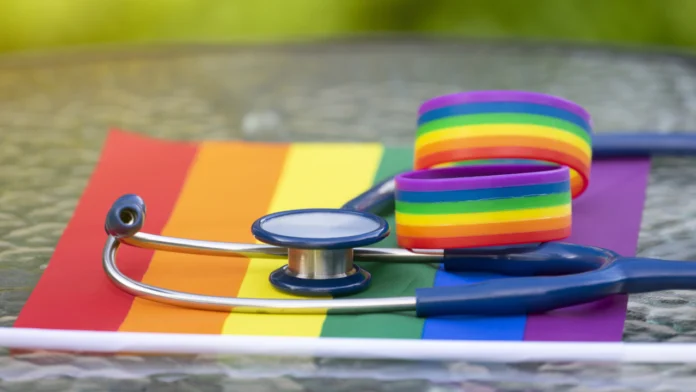Mental health includes past and present experiences that inform our personalities and everyday lives. Many LGBTQ+ persons experience discrimination and trauma that can lead to internalized shame or general distress in life. This makes LGBTQ+ therapy essential.
Many in the LGBTQ+ community working through mental health conditions consider it paramount to find therapists who understand and affirm diverse identities and experiences. After all, strong mental health is more than just the absence of disorders like depression.
Therapy.com is user supported. We receive a commission fee from purchases made through BetterHelp links.
Learn More
Finding therapists who integrate specialized experience into their treatment approach is essential. There are a few different ways you can search for an LGBTQ+ affirming therapist near you or online.
GLMA is an organization specifically focused on helping LGBTQ+ individuals find quality and affirming healthcare. You can search their online database for therapists in your area.
Many health insurance sites also offer search filters to narrow search results of network providers. If you aren’t able to identify whether a provider is LGBTQ+ affirming from their profile online you can ask for a free consultation with the therapist before setting up regular sessions.
There are many benefits of seeing a lesbian therapist, gay therapist, or gender affirming counselor. These therapists typically have unique insight into LGBTQ+ issues and regard you with understanding and compassion.
They might be more cognizant of and careful to avoid potential bias in their diagnosis and treatment plan. They may also be better equipped to develop an effective, trauma informed approach to therapy.
Types of Therapy for LGBTQ+ Individuals
There are many different types of therapy for LGBTQ+ community. The type that’s best for you depends on the specific needs you have and the therapy goals you establish.
Cognitive Behavioral Therapy
Cognitive behavioral therapy (CBT) is an evidence based approach to treatment that works well for different issues like depression, anxiety and trauma. CBT focuses on identifying, challenging and restructuring our thought patterns to positively affect our emotions and behaviors.
Techniques used in CBT include finding cognitive distortions in your thought process and monitoring your thoughts to identify patterns. Individuals can then stop their thoughts and purposefully use positive self talk and affirmations. Practicing exercises to relax your mind and body can also reduce stress and facilitate cognitive restructuring.
Trauma Informed Therapy
Trauma informed therapy is another approach that’s often helpful to the LGBTQ+ population. If you have experienced trauma this approach can help you recognize how the experience has impacted you and develop strategies for dealing with and overcoming that unresolved trauma.
You’ll also learn to take your trauma experiences into account when setting goals and working toward healing. Using a trauma informed approach places you in a safe environment so you’re not traumatized again through therapy.
Identity Affirming Therapy
Identity affirming therapy is exactly what it sounds like. This form of counseling encourages you to explore your identity without judgment. This allows you to feel supported throughout the therapeutic process. You can explore your sexual or gender identity or how you see yourself in the context of your past history, present circumstances and future goals.
Transgender Therapy
Specialized transgender therapy is also available for those specifically needing support in their gender identity exploration. Transgender counseling may include exploring your emotions concerning potential gender dysphoria.
Therapy.com is user supported. We receive a commission fee from purchases made through BetterHelp links.
Learn More
You can also better understand various surgical, medical and therapeutic options to manage gender dysphoria. The therapist might also have ideas on how to cope with discrimination or trauma related to transgender identity.
LGBTQ+ therapy can help with many mental health challenges like anxiety, depression and discrimination. You’ll learn coping skills to maintain your mental wellness as you navigate difficulties and life stresses.
Gay and Lesbian Relationship Counseling
Many relationships benefit from relationship counseling at some point and same sex couples’ relationships are no exception. Counseling helps individuals and partners navigating sexuality, relationships and family acceptance.
The benefits of gay couples counseling can include:
- Improved communication
- Better conflict resolution
- Building or re-establishing trust
- Strengthened intimacy
- Better understanding of yourself and your partner
If you’ve never experienced relationship counseling you may be wondering what to expect from gay couples counseling. Each practitioner will have their own specific approaches but you can most likely expect some of the following:
- A nonjudgmental space to discuss facets of your relationship that may not fit into the heteronormative constructs
- Questions exploring your conflict resolution styles
- Exploration into your communication and intimacy within the relationship
- Fair and unbiased support for each person in the relationship
Gay and lesbian marriage counseling can offer support for same sex couples who need help improving aspects of their relationship while taking LGBTQ+ issues into account.
Gender Affirming Therapy
The role of an affirming LGBTQ+ therapist is to provide emotional support and mental health care for gay, lesbian, bisexual, transgender and queer individuals. These therapists offer a safe space to express your feelings and better understand your difficulties. They can also be a great resource for finding other gender affirming professionals that may be involved in your treatment.
Therapy.com is user supported. We receive a commission fee from purchases made through BetterHelp links.
Learn More
If you are looking for resources in navigating gender affirming medical care and social transitions, the following programs may be of assistance:
- National Center for Transgender Equality (NCTE)
- World Professional Association for Transgender Health (WPATH)
- Human Rights Campaign (HRC)
- The Trevor Project
- Trans Lifeline
- PFLAG
Transgender counseling supports gender identity exploration and transition related concerns. If you are experiencing gender dysphoria and need someone to talk to about it, a trained therapist can help you process and manage these feelings in healthy and productive ways.
For many individuals who have transitioned, therapy can help you cope with potential ongoing issues, including:
- Discrimination and its impact on you
- Anxiety around safety or how you are perceived in public
- Ongoing gender dysphoria or body dysmorphia
- Coping with the reactions of friends and family
FAQs
You can use our directory of providers to look for therapists in your area that specialize in LGBTQ+ affirming care. You can also check with your insurance provider to see which practitioners are covered by your plan.
If you’re unsure of a potential therapist’s viewpoints on LGBTQ+ issues, ask for a free consultation to discuss with them before committing to ongoing sessions.
LGBTQ+ therapy that takes the LGBTQ+ identities, lifestyles and cultures into account. When therapists are well informed on the issues that affect this community they can better support each client. You will set your own therapy goals with a provider who is knowledgeable and supportive about LGBTQ issues.
Some of the therapeutic approaches that work well include cognitive behavioral therapy (CBT), trauma informed treatment (TIT) and gender affirming care.
Transgender therapy provides specific support to individuals who are exploring their gender identity.
Whether you have a clear understanding of your gender identity or not, this type of therapist will meet you where you are in your journey and look into various treatment options that can help with beginning the transition process. If you are already in your transition process your therapist will offer supportive care for your therapeutic needs.
Absolutely! Many trained professionals offer relationship counseling to same sex couples.
How to Find the Right LGBTQ+ Therapist
Given all the benefits of LGBTQ+ informed care, you are probably wondering, “How can I find an LGBTQ+ therapist near me?” The good news is, you have a lot of options.
You can do online searches to find LGBTQ+ therapists who specialize in LGBTQ+ affirming mental health care. GLMA is an organization focused on providing affirming resources including therapists. Psychology Today has a large database of professional counselors, and you can specify LGBTQ as a search term.
Therapy.com is user supported. We receive a commission fee from purchases made through BetterHelp links.
Learn More
Some questions you can ask when looking for the right therapist are:
- What experience do you have working with LGBTQ+ clients?
- What are your therapeutic approaches and how can they help me?
- How do you approach same-sex relationship counseling?
- What resources do you have for gender-affirming care?
- Do you offer online therapy?
Online therapy is also becoming a popular option. There are some unique benefits to online therapy such as:
- It can decrease anxiety about attending therapy in a new place.
- It is convenient.
- You don’t have to worry about commute times to and from appointments.
- You and your partner can attend from different locations.
LGBTQ+ therapy is available in many different formats and can greatly improve your mental, emotional and relational health.



